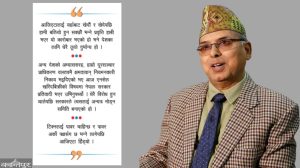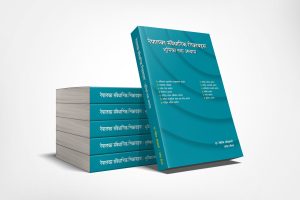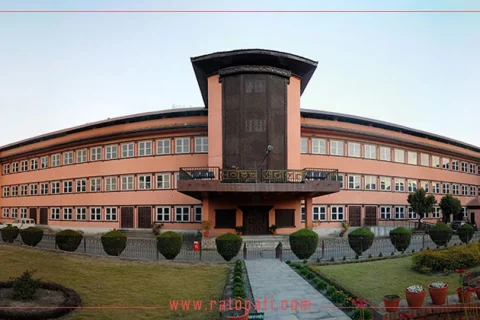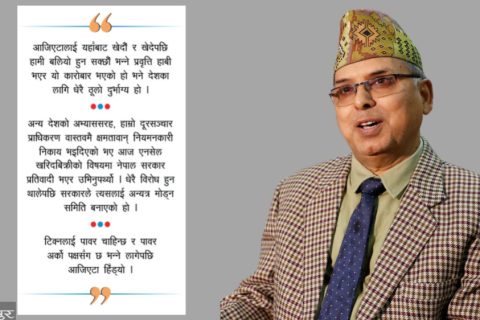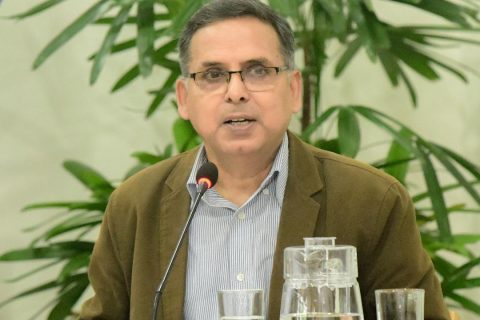Dr. Bipin Adhikari is a legal scholar. His areas of special expertise include comparative constitutionalism, human rights and the rule of law and good governance. In addition to his opinions on constitution building, Adhikari has a number of other publications to his credit. He spoke to Constituent Assembly Dialogue team on the recent decision of the Supreme Court on the validity of the Interim Constitution (Ninth Amendment) Bill 2011. Citing the doctrine of necessity, the Supreme Court in this case declined to quash the controversial amendment bill on the ground of unconstitutionality, thereby permitting the extension of the tenure of the Constituent Assembly (CA) by three more months on May 28, 2011 . Excerpts:
We noted your comments in the media that the Supreme Court could have avoided relying on the doctrine of necessity in order to validate the Interim Constitution (Ninth Amendment) Bill 2011. What is your main argument?
Article 64 of the Interim Constitution is very clear. It clearly states that unless otherwise dissolved earlier by the Constituent Assembly (CA) itself, the term of the house shall be two years. There is only one exception to this rule. The term of the house may be extended for up to six months in the event that the task of drafting the constitution is not complete due to the proclamation of a state of emergency in the country. The court could have delivered its decision based on this clear-cut provision.
How do you read the court decision? Did it not base itself on Article 64 as you noted?
No, the Supreme Court tried this time to read the political situation in the country which was not necessary. It ignored the fact that the Constituent Assembly was a fixed term house, and there was no emergency in the country in May 2011 to allow it extension on exceptional ground.
When the constitutionality of the eighth amendment bill was challenged last year, the court agreed that there could be no extension beyond six month, whether there is an emergency or any other dire necessity. But it declined to declare the unconstitutional extension null and void at that time because it thought that would negatively affect the achievements of the CA made during this extended period. But the judgment of the court left little space for the CA to work on another extension after the completion of this unconstitutionally acquired one year additional term.
It is therefore natural that the issue was taken up once again by public interest litigants, when the house passed Interim Constitution (Ninth Amendment) Bill extending the term of the house for another three months. But the Supreme Court annulled the writ petition on the ground that despite the efforts of political parties, the twin tasks of peace building and constitution drafting processes remain incomplete and the extension of CA’s tenure was necessary to complete these tasks. Apparently, it ignored the emergency clause, and in the absence of the enabling provision in the constitution, it relied on the doctrine of necessity to validate the extension.
This interpretation is not sound. The court has become unnecessarily generous. It has misread the political economy of the peace process and constitution building. There is a fear that the House may not complete the tasks for several reasons even though the court is prepared to give unlimited extension to the house.
What are these reasons?
I think there are ideological divides between the major political parties who control the two-third votes in the house. They differ with each other on both the peace process and constitution building themes. There are thematic differences on the basic issues of democracy, constitutionalism and the rule of law. There is also reluctance to handover the Maoist fighters to the state. There is little determination to compromise and find a way out to all controversial issues. Things might not change unless there is change in the strengths of the political parties, or current balance of power in the Constituent Assembly.
In fact, it is possible to agree on a framework constitution, and to leave many of these problems to the future parliament. It is also possible to create a small constitution drafting commission from the existing house and say good bye to the Constituent Assembly. In this case, the national parliament elected under the new constitution promulgated by the Commission could approve the new constitution by a two-third majority with or without amendment. But nobody wants to wait till next elections. The house has become lethargic. It does not have political drive. The extended period has not been used for constitution building as such. All options are there, but they have not been explored.
The decision of the court only gives continuity to this status quo on the strength of a doctrine which is controversial as far as the constitutional law is concerned. It does not help the process of change. The problem lies there.
Why do you think the doctrine is controversial in constitutional jurisprudence?
Let me tell you that the common law that we tend to look back on recognizes the existence of this doctrine. It was an English jurist, Henry de Bracton, who pleaded in the thirteenth century ‘that which is otherwise not lawful is made lawful by necessity.’ Another jurist William Blackstone of the eighteenth also recognized it as a matter of principle.
Alexander Hamilton, the constitutional expert of the United States, wrote that necessity is admitted in all moral reasoning as an exception to general rules.
In the 19th century, the doctrine was combined into a set of narrow exceptions to constitutional limitations, often under terms like “affected with public interest” or “public power.” It was never invoked as a credible constitutional rule. The jurisprudential value of the doctrine of necessity has always been controversial in constitutional law. It hits at the heart of the concept of the supremacy of the constitution. It weakens the concept of limited government. It promotes judicial activism in an area where politicians have to take the lead and maintain their accountability to the voters.
Do you mean that the doctrine is not in use in other established constitutional democracies of the world?
I do not want to claim too much. As professionals we keep track of what is going on in the rest of the common law countries. We do not generally find constitutional courts relying on this doctrine as an established principle.
Never in the history of modern Europe, America, and Australia has the doctrine of necessity been effectively invoked to justify deviations from the written constitutional provisions.
The doctrine has not been used in any civilized country to give sustenance to a new extra-constitutional regime. It does not provide a valid basis for abrogating the constitution, or minimizing its significance. It is not intended to help the political vested interests in power. It is never used to check the options of the common people as to their political leadership. It does not authorize the executive to raise money for its operations without parliamentary approval, or to jail people without conviction by a court of law. It does not permit a constitutional coup. Necessity does not demand any of that.
What is supreme in a democracy is the constitution and what the constitution is informed by is the concept of the rule of law. The doctrine of necessity has the potential of affecting these values adversely in most of the cases.
What would be the genuine cases in which this doctrine could be invoked comfortably?
My point is that institutions like the Supreme Court should always be sensitive about invoking this doctrine. Restraint on the exercise of power, or the rule by convenience is what the concept of constitutionalism is all about. The doctrine should be invoked only after careful assessment of conditions for its application. The motives of the government in power must also be considered. The doctrine should not be applied where its effect is to compromise with the supremacy of the constitution and the rule of law. These parameters limit the operation of the doctrine in constitutional law.
In Canada, some decades ago, the Supreme Court considered a series of decisions of courts in other jurisdictions within the Commonwealth of Nations in which this doctrine had been applied to validate acts which were strictly speaking unconstitutional. From these cases, it was concluded that the courts will recognize unconstitutional enactments as valid where a failure to do so would lead to legal chaos, and then violate the constitutional requirement of the rule of law. The court decision had helped the country emerge from the problem, and not to throw it in the trap of unrestrained powers.
What are the bad examples?
Most of the examples are bad examples. One could collect these examples from countries like Cyprus, Pakistan, Grenada, Nigeria, where the doctrine was haplessly or ineptly applied. In Pakistan, the imposition of martial law was validated on the doctrine of necessity in a case filed by Begum Nusrat Bhutto against Chief of the Army. In a 1985 judgment, in Grenada, the Chief Justice of the High Court invoked this doctrine to validate an illegally established court then trying for murder the persons who had conducted a coup against its former leader. It is just about one and half year before, the Nigerian parliament authorized the vice president to act as an acting president even though the president did not want to delegate his power to him on the strength of the doctrine of necessity. All these instances were deviation from strict compliance with constitutional provisions.
What is your advice for the future?
The doctrine of necessity is not the rule. It is an exceptional arrangement. Even though it has many uses for the legal system, its use in the domain of constitutional law is very difficult. It has many unseen side effects.
A court can invoke it to enable the national army to respond to the foreign aggressors, when one finds that the compliance with constitutional provisions might take time, and the country may remain undefended against such attack. It is possible to invoke it to allow the civil servants to respond to the situation of sudden and stark crisis affecting the life of thousands of people, or the government to deal with similar circumstances not provided for in the written constitution. These situations are not just excuses for the politicians. They are difficult situations requiring immediate interventions. Any such deviation must be essentially of a temporary character and it must cease to apply once the crisis has passed.
I am sure the doctrine of necessity cannot be an alibi for an inefficient government, or a house which does not find any reason to complete the constitution writing process.
Any last words …?
This issue is likely to come to the court again after the expiry of the three month extension. I do not think the CA will be able to draft a new constitution due to the reasons I highlighted. In such a scenario, it will be advisable for anybody to require the government, or the present generation of political parties, to work on affordable options, than extending the tenure of the house again on the basis of doctrine of necessity. There is no such necessity at all.


